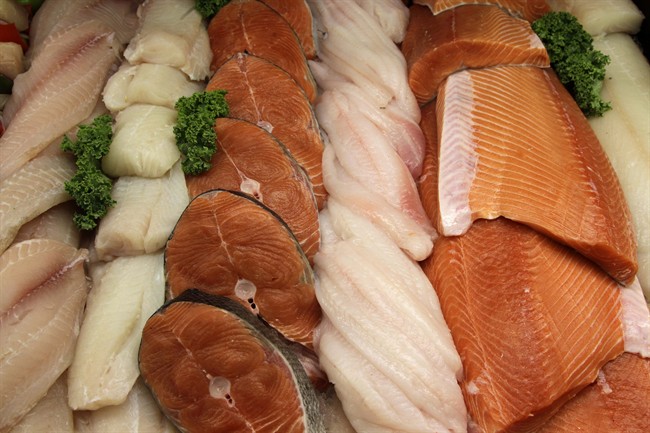Expectant moms scaling back on how much fish they’re eating while pregnant should pay attention to new research: a large study out of Spain suggests that eating more fish even in the first trimester improved brain function in babies.

After following 2,000 expectant moms until their babies’ fifth birthday, Barcelona scientists say that kids whose moms ate more fish during pregnancy had improved brain function. The findings counter warnings that fish consumption may tamper with healthy brain development in babies.
“Seafood is known to be an important source of essential nutrients for brain development, but at the same time accumulates mercury from the environment, which is known to be neurotoxic,” lead researcher, Dr. Jordi Julvez, said in an email to Global News.
For his study, Julvez and his team at the Center for Research in Environmental Epidemiology looked at the health data of 2,000 women across four Spanish provinces between 2004 and 2008.
READ MORE: How much fish should pregnant women eat?
While the data was pooled from the Spanish Childhood and Environment Study, the team zeroed in on consumption of fish including swordfish, tuna, sardines, hake and sole. The fish were categorized according to fatty fish, smaller oily fish and lean fish, along with shellfish.
The expectant moms had their blood levels and cord blood tested for vitamin levels and exposure to mercury and other pollutants. By the time the kids turned one and five years old, they underwent cognitive testing.
- ‘Bacterial vampirism’: Deadly pathogens attracted to human blood, study finds
- Shoppers faces proposed class action over claims company is ‘abusive’ to pharmacists
- Most Canadian youth visit dentists, but lack of insurance a barrier
- Landmark smoking ban that would phase out sales passes U.K. parliament
READ MORE: Do babies inherit junk food addictions from their moms?
The women typically ate about three servings of seafood per week while they were pregnant. But if they ate about 10 grams more per week, their kids’ test scores improved. The link was strongest between improved test scores and if women ate more fish during their first trimester.
Right now, Health Canada says when pregnant, women need more omega-3 fatty acids in their diets to help their babies with brain development. The federal agency recommends that moms eat at least five ounces of cooked fish every week. That’s about one to 1.5 servings.
“Yet many women may avoid eating fish altogether because of concerns about the safety of fish intake during pregnancy,” Health Canada says on its website. It did not yet return a request for comment on Tuesday.
READ MORE: New moms, lose baby weight or face diabetes, heart health risk, study warns
In June 2014, for the first time, the U.S. Food and Drug Administration issued a recommendation for minimum intake of fish for pregnant women.
It called for eight to 12 ounces of a variety of fish each week – or about two to three servings.
Even then, European guidelines doled out by its Food Safety Authority say at least four servings of fish per week is beneficial for your growing baby’s neurodevelopment.
He pointed to oily and lean fish as expectant moms’ best picks because they’re packed with healthy fats, acids, protein and vitamin D.
READ MORE: Is low iron intake during pregnancy to blame for autism risk?
Fish lower in mercury includes salmon, shrimp, Pollock, tuna (light canned), tilapia, catfish and cod, according to the FDA.
Four types of fish were also singled out as options to avoid: tilefish from the Gulf of Mexico, shark, swordfish and king mackerel. While (albacore) tuna should be limited to only six ounces a week.
For his next steps, Julvez said he’ll follow the kids and their health until they’re eight years old to measure neuropsychological development.
READ MORE: How a father’s diet, lifestyle affect his baby’s healthy development
“We would like to study whether these beneficial effects persist by the time the children get older,” he told Global News. He said they’ll also assess the different subtypes of seafood and how they affect child development.
His full findings were published Monday in the American Journal of Epidemiology. Read the study.
carmen.chai@globalnews.ca
Follow @Carmen_Chai


Comments